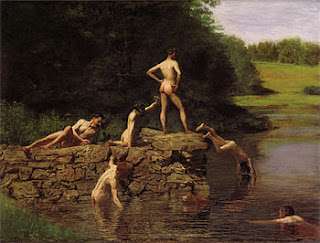Thomas Eakins: The Swimming Hole (1884-85)
If the great American poet Walt Whitman set out to chronicle one subject above all others, it was the flowering of democracy within the United States. But his vision of democracy passes far beyond conventional models of liberalism and is curiously eroticized.
The inherent queerness within Whitman's political thinking is now generally accepted by critics. But many still choose to quickly pass over this with a mixture of embarrassment and homophobic distaste. They tell us, for example, that Eros is to function as the glue within Whitman's democracy to come, but fail to specify the particular nature of this adhesive love. Whether they like it or not, however, physical tenderness between men remained crucial for Whitman and his thinking was not based on a purely abstract ideal of comradeship and solidarity.
This flooding of the political sphere with manly love is something that Lawrence finds irresistible, although he is troubled by the exclusion of women from such a world. Thus, in his own model of democracy, Lawrence is keen to include both sexes and reinstate the male-female relationship as primary. That said, he continues to insist that vaginal intercourse isn't the great be-all and end-all that many people believe it to be:
"The vagina, as we know, is the orifice of the hypogastric plexus ... It is the advent to the great source of being ... But beyond all this is the cocygeal centre. ... Here, at the root of the spine, is the last clue to the lower body and being ... Here is the dark node which relates us to the centre of the earth, the plumb-centre of substantial being. Here is our last and extremest reality."
- D. H. Lawrence, 'Whitman' (Intermediate Version, 1919), Studies in Classic American Literature, (CUP, 2003), 365-66.
Thus it is that anal sex assumes vital importance within Lawrence's philosophy and throughout his fiction. If this is invariably heterosexual in character, the opportunity to discuss Whitman's work allows Lawrence to concede that homosexual coition is an equally valid form of interchange and establishes "the same perfection in fulfilled consciousness and being" [ibid., 366], as an act of heterosexual intercourse.
To conclude, then, both Whitman and Lawrence encourage us on an open road towards a queer model of democracy founded upon many forms of touch, including sodomy and the interpenetration of passionate love. That is to say, a democracy born from a new economy of bodies and their pleasures and not merely the inhuman flow of capital.









